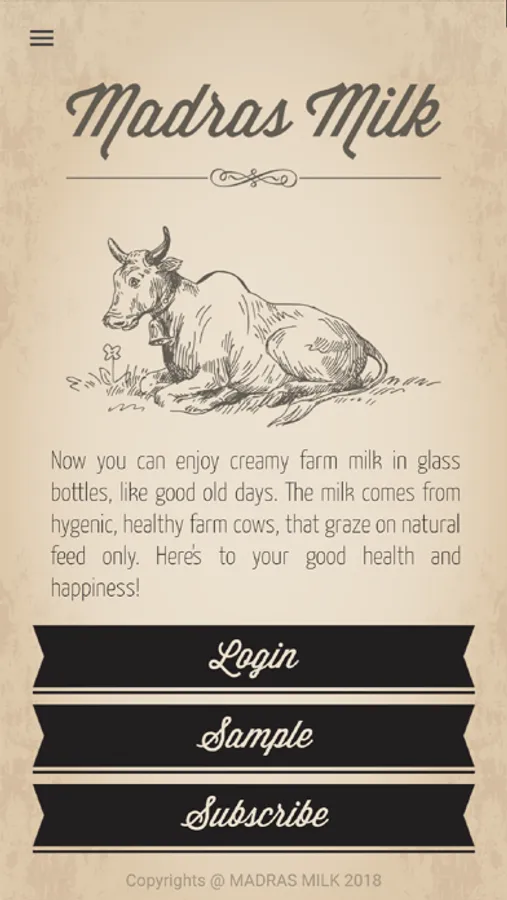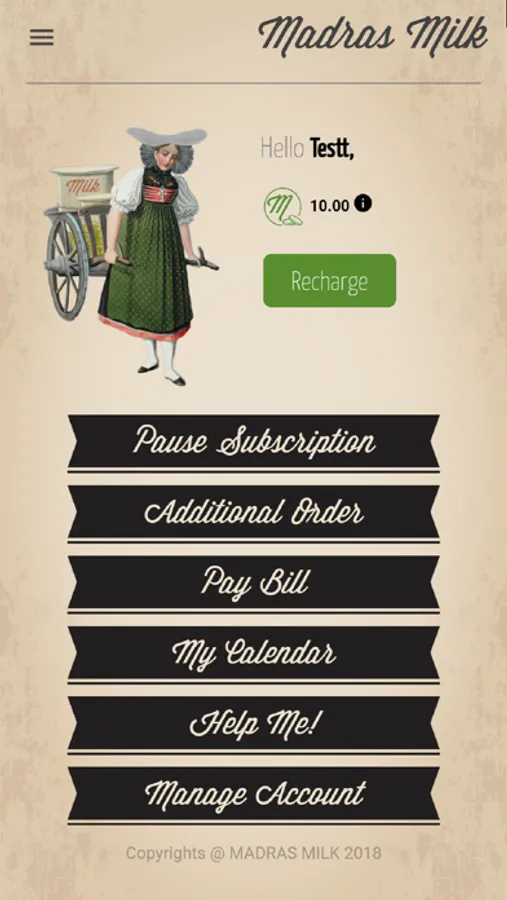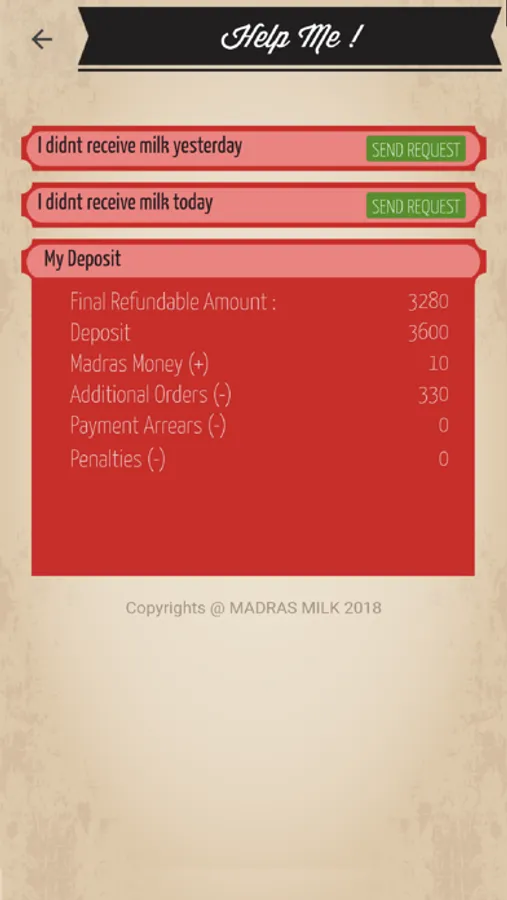AppRecs review analysis
AppRecs rating 4.5. Trustworthiness 45 out of 100. Review manipulation risk 28 out of 100. Based on a review sample analyzed.
★★★★☆
4.5
AppRecs Rating
Ratings breakdown
5 star
100%
4 star
0%
3 star
0%
2 star
0%
1 star
0%
What to know
⚠
Unusually uniform ratings
100% of sampled ratings are 5 stars with very little variation
About Madras Milk
COW'S POWER DIET
Apart from the lovely green pastures they graze on, they are fed farm-grown organic sugarcane, millets for energy, oil cakes for protein, hay for a cooling effect, and bran for good digestion. 95% of the feed is grown organically in the farm itself. The rest 5% is obtained from outside.
CHILLED OUT
We chill the milk to 4C within an hour from collection and keep it in controlled conditions on the farm, ready for collection.
This milk travels from the farm to the distribution point in the city, where it is filtered and cooled in line with storage requirements. We keep it at 4C so bacteria can’t multiply and the milk is always safe to drink.
IN GLASS BOTTLES
The milk is brought to you in glass bottles, just like the good old days. We do this so that milk tastes good, and to keep it away from the dangerous toxins released by plastic containers. These toxins are known to cause Cancer, Infertility and Autoimmune disorder.
WHAT DOES ORGANIC MEAN?
Think of organic as a guaranteed standard.
As a result, we believe the milk we produce is the most pure and natural you can find.
Our farms are peaceful, serene places that work with, not against, nature. Crops and local wildlife are nurtured and used as natural assets to feed the land and prevent illness on the farm. Our cows are free-range. They spend most of their time roaming, eating and dozing outdoors, and only come in when the weather’s too hot.
When you buy organic milk you are guaranteed:
Free-range cows
Natural diet
No routine use of antibiotics
No artificial, chemical fertilisers or herbicides used on the farms
High standards of animal welfare
Farming that works with nature for maximum biodiversity
WHAT DO THE COWS DO ALL DAY?
We stand by this principle – getting the best milk starts with happy, healthy cows.
Our cows spend as much time as possible outside, grazing on rich pastures. It’s important that, wherever they are, they are comfortable. They spend a lot of their day lying down, chewing the cud and resting – this is always a good sign that the cows are content.
Cows naturally form social groups. They like socialising with the same cows each day. They are found head butting each other playfully.
We shelter our cows in large barns, where they must have plenty of room to move around and communicate with each other. Each barn is well aired.
WHY DOES ORGANIC COST MORE?
Our milk costs more simply because it costs the farmer more to produce it.
Organic milk is a little more expensive than standard milk because making a product that’s pure, produced naturally and guarantees the highest animal welfare isn’t cheap or easy.
Specifically, organic cattle feed is more expensive, fewer cows are farmed per acre of organic land and the volume of milk each organic cow produces is at a lower, more natural, level. This means the farmer has to charge more for the milk to cover his costs for feed, labour and volume.
ANTIBIOTICS
Many non-organic, intensive farms use antibiotics to prevent possible infection, which can damage productivity. There is growing evidence that the routine use of antibiotics is linked to emergence of superbugs in animals, with potential long term unknown consequences for humans. For this reason, we never use antibiotics on our farms.
Now you can use the Madras Milk app to subscribe, pause, pay and much more though our app.
Apart from the lovely green pastures they graze on, they are fed farm-grown organic sugarcane, millets for energy, oil cakes for protein, hay for a cooling effect, and bran for good digestion. 95% of the feed is grown organically in the farm itself. The rest 5% is obtained from outside.
CHILLED OUT
We chill the milk to 4C within an hour from collection and keep it in controlled conditions on the farm, ready for collection.
This milk travels from the farm to the distribution point in the city, where it is filtered and cooled in line with storage requirements. We keep it at 4C so bacteria can’t multiply and the milk is always safe to drink.
IN GLASS BOTTLES
The milk is brought to you in glass bottles, just like the good old days. We do this so that milk tastes good, and to keep it away from the dangerous toxins released by plastic containers. These toxins are known to cause Cancer, Infertility and Autoimmune disorder.
WHAT DOES ORGANIC MEAN?
Think of organic as a guaranteed standard.
As a result, we believe the milk we produce is the most pure and natural you can find.
Our farms are peaceful, serene places that work with, not against, nature. Crops and local wildlife are nurtured and used as natural assets to feed the land and prevent illness on the farm. Our cows are free-range. They spend most of their time roaming, eating and dozing outdoors, and only come in when the weather’s too hot.
When you buy organic milk you are guaranteed:
Free-range cows
Natural diet
No routine use of antibiotics
No artificial, chemical fertilisers or herbicides used on the farms
High standards of animal welfare
Farming that works with nature for maximum biodiversity
WHAT DO THE COWS DO ALL DAY?
We stand by this principle – getting the best milk starts with happy, healthy cows.
Our cows spend as much time as possible outside, grazing on rich pastures. It’s important that, wherever they are, they are comfortable. They spend a lot of their day lying down, chewing the cud and resting – this is always a good sign that the cows are content.
Cows naturally form social groups. They like socialising with the same cows each day. They are found head butting each other playfully.
We shelter our cows in large barns, where they must have plenty of room to move around and communicate with each other. Each barn is well aired.
WHY DOES ORGANIC COST MORE?
Our milk costs more simply because it costs the farmer more to produce it.
Organic milk is a little more expensive than standard milk because making a product that’s pure, produced naturally and guarantees the highest animal welfare isn’t cheap or easy.
Specifically, organic cattle feed is more expensive, fewer cows are farmed per acre of organic land and the volume of milk each organic cow produces is at a lower, more natural, level. This means the farmer has to charge more for the milk to cover his costs for feed, labour and volume.
ANTIBIOTICS
Many non-organic, intensive farms use antibiotics to prevent possible infection, which can damage productivity. There is growing evidence that the routine use of antibiotics is linked to emergence of superbugs in animals, with potential long term unknown consequences for humans. For this reason, we never use antibiotics on our farms.
Now you can use the Madras Milk app to subscribe, pause, pay and much more though our app.



